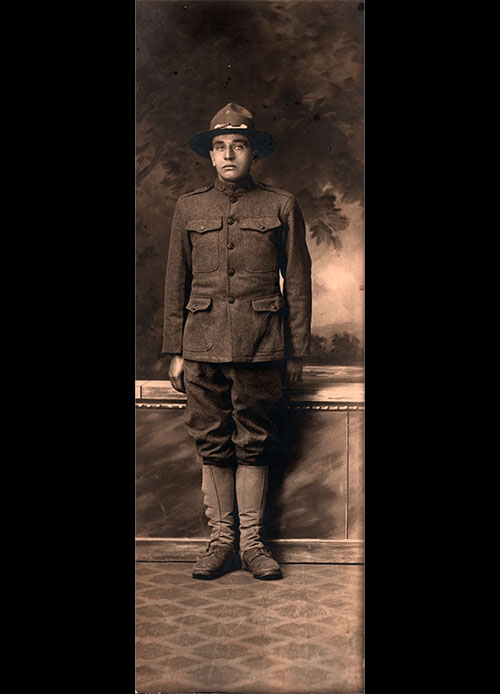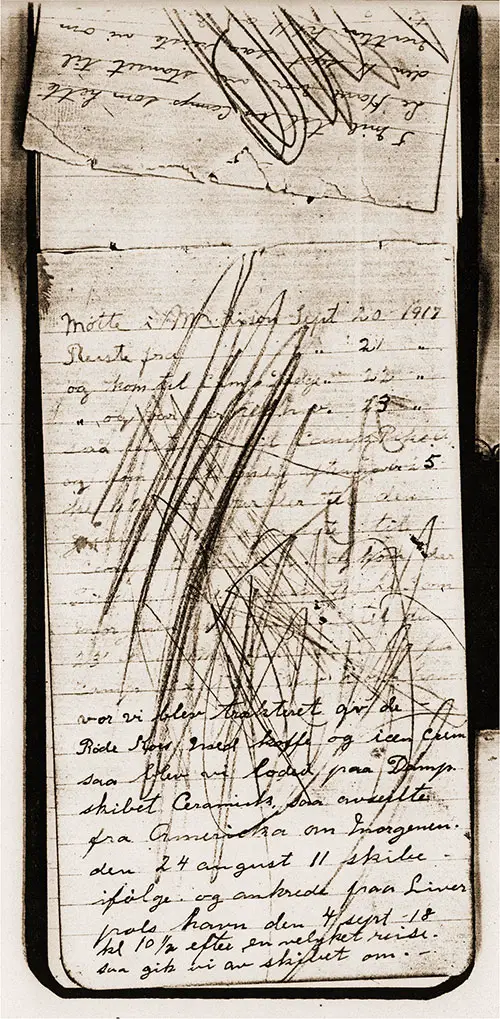WW1 Soldier's Diary Extracts - 1917-1918

Corporal Ludvig K. Gjenvick, Company C, 346th Infantry, 87th Division, National Army, American Expeditionary Force, 1918. Gjenvick-Gjønvick Family Archives Photograph. GGA Image ID # 184bb11ae8
A.E.F. Army Soldier Ludvig Gjenvick was a Norwegian immigrant who arrived in America in 1913. He lived and worked on a farm in Minnesota until being drafted by the Army in 1917. Upon entering the Army, Ludvig worked hard at learning English, became an American Citizen, and rose to Corporal's rank.
Below are excerpts from the readable portions of that diary kept by Corporal Gjenvick of the Allied Expeditionary Force in World War I, in English translated from the original in Norwegian.

Sample Page from the Diary of Corporal Ludvig K. Gjenvick, National Army, 1918. Gjenvick-Gjønvik Family Archives. GGA Image ID # 18d8691562
September 1917
Corporal Ludvig Kristian Johansen GJENVICK 87th Division, 346th Infantry, Company "C" Mustered in Madison, Minnesota 20 September 1917 Departed from Madison, Minnesota 21 September 1917 and arrived at Camp Dodge 22 September 1917
[10 lines of illegible text]
NOTE: Corporal GJENVICK was transferred from Camp Dodge to Camp Pike and was a soldier of the 346th Infantry, Company C. He completed his training at Camp Pike and was sent to Camp Dix prior to deployment overseas. The diary continues below:
September 1918
... where we were treated to coffee and ice cream by the Red Cross.
Then we were loaded onto the steamship "Ceramic". Then we sailed from America on the morning of August 24th [1918], accompanied by 11 other ships, and anchored in Liverpool's harbor on September 4, 1918 at 10:30 following a safe journey. Then we disembarked from the ship on... the morning of September 5th, [1918] at 6 o'clock, and marched through the streets of Liverpool to the train station, where we were treated to coffee and cookies by the Red Cross.
Then we got onto the train and traveled across England to Winchester, and arrived there at 5 o'clock [17:00] in the afternoon. Then we marched 2½ miles to a rest camp that was called Morn hill, and arrived there at 7:30 [19:30] in the evening. Then we were there until September 8th [1918], from where we traveled to Southampton on Sunday morning, and arrived there at 2 o'clock [14:00] in the afternoon.
Read the Unit History for the 346th Infantry Company C and get the complete story.
Then we were loaded onto a boat again, and at 5 o'clock [17:00] in the afternoon, we left England for France, where we landed at Le Havre on the morning of September 9th [1918] at 1 o'clock [01:00] after a storm-filled night. Then we got off the ship on the morning of September 9th [1918] at 6 o'clock [06:00], and marched... 5 miles to a camp that was called Le Havre, where we stayed until September 11th [1918].
Then we left at 11 o'clock [23:00] at night and marched 3 miles to the train station in Le Havre, where we took the train and traveled in baggage cars to Laigle, where we stopped on September 12th [1918] at 1 o'clock [13:00] for coffee. Then we traveled on from there at 2 o'clock [14:00] in the afternoon, and stopped in (Mount Falles?) on September 13th [1918], where we got off. We were at the station for 1 hour, then we marched 8 miles to the little village of Salignac, where we stayed with a farmer.
On the morning of September 14th we were awakened by the farmer, who came and gave us a drink. Got an impression of the friendliness of the French people. France has been hit hard by the war.
The French people have sacrificed and given everything they had out of love for their homeland. There were no young men to be seen, only... women, children and old men. The children came up and shook our hands as we walked past, and welcomed us.
Then we departed on the morning of September 23rd [1918] at 7:30. We marched 14 miles in the howling rain to the town of Saintes, where we again took the train and traveled in baggage cars to Montoir, where we arrived on September 24th [1918] at 11 o'clock [11:00] in the morning.
We (lived?) around St. Nazaire, were out on convoys to Is-sur-Tille and to (Ecomay?). Then we finally moved to Camp (Gurthre?) and were there for 2 weeks. Then we moved to Camp 2. Were there for 2 days, then moved to Camp 1. [last line illegible] and were in camp for 2 days.
On Palm Sunday, April 13th [1919], we stood inspection before General Pershing, and then on Monday, April 14th [1919], we boarded the ship "Princess Matoika" for America, and sailed on April 16, 1919 from St. Nazaire.
After a safe journey, we landed in Newport News, Virginia on Sunday, April 27, 1919, and then went to Camp Stuart.
On the "Ceramic", we had 8 millions worth of (?) with us over the ocean. On the night of August 31, 1918 we were on the Atlantic Ocean, and in thick fog so that no one could see. 5 blasts of the ship's horn were given, and with great alarm all men went on deck, but fortunately they were (only a message?)
Read an Immigrant's Story -- the biography of Corporal Ludvig K. Gjenvick.
